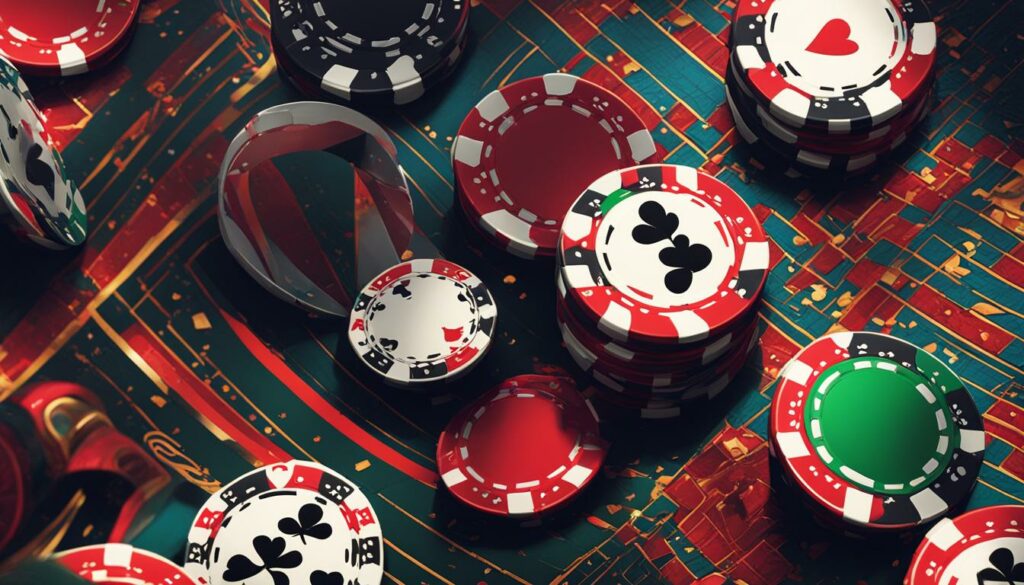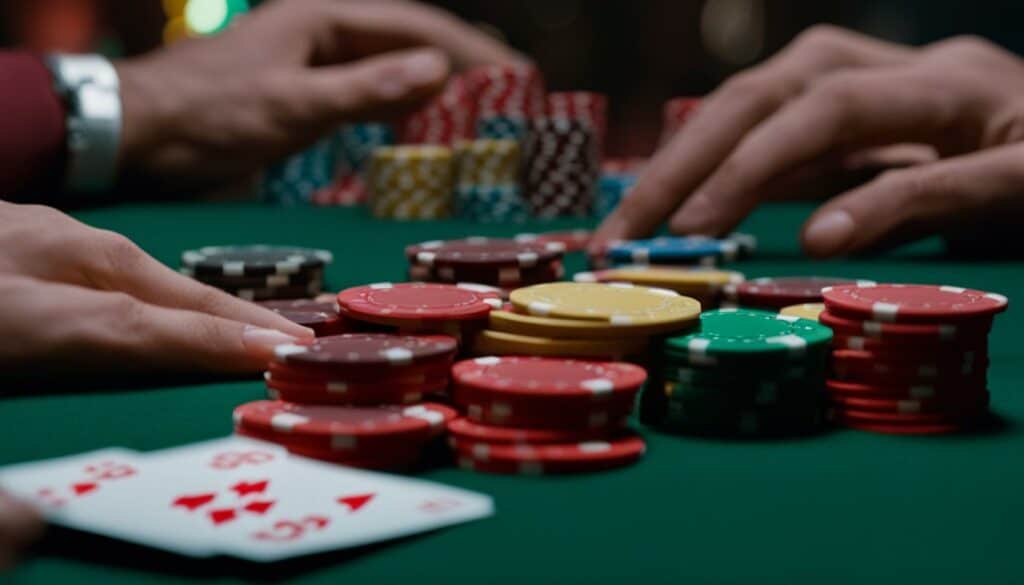Have you ever wondered why poker players are constantly fiddling with their chips during gameplay? There is a psychological significance behind these actions that may not be immediately apparent to outsiders. In this article, we will explore the reasons behind playing with poker chips and the role they play in the game of poker.
From stacking chips to shuffling them, every action serves a purpose that directly impacts a player’s strategy and mindset. Understanding why poker players play with their chips can provide valuable insight into the game and its players.
So let’s take a deep dive into the psychology behind poker chip handling and the reasons that drive this behavior at the poker table.
The Role of Poker Chips in Gameplay
Poker chips are a fundamental part of the game, providing players with a physical representation of their bets and creating a unique tactile experience. But their role in gameplay goes beyond just providing a means of betting.
One of the main reasons why players stack their chips during play is to keep track of their bets and the bets of their opponents. By stacking their chips in a certain way, players can easily see how much they have in front of them and how much they can potentially win or lose in a given hand. Chip stacking can also be used as a strategy to intimidate opponents or give the illusion of having a larger bankroll.
In addition, the colors and denominations of poker chips have a significant impact on gameplay. Higher denomination chips often represent more valuable bets or hands, while lower denomination chips are used for smaller bets or to make change. This system allows for more complex betting strategies and increases the level of strategy required to be successful in the game.
Overall, the role of poker chips in gameplay is essential and cannot be overstated. From providing a means of betting and creating a unique tactile experience to influencing player strategy and creating a psychological edge, poker chips are one of the most important aspects of the game.
The Significance of Chip Stacking in Poker
Chip stacking is a common behavior among poker players, but it’s not just for show. Stacking chips in a certain way can help players keep track of their bets and strategize their next move. For example, a player might stack their chips in such a way that they can easily determine how much they need to call to stay in the game.
Chip stacking can also be used as a tool to deceive opponents or create a sense of uncertainty. By stacking chips in an irregular or haphazard manner, a player can give the impression that they are unpredictable or that they have a larger bankroll than they actually do.
Ultimately, chip stacking is just one of many behaviors exhibited by poker players that contributes to the unique psychology and strategy of the game.
The Psychology Behind Poker Chip Handling
Playing with poker chips is a behavior observed in many poker players. It is not only a casual habit but also has psychological significance. Handling chips can elevate confidence and create a sense of control during the game. The tactile experience of handling chips can induce feelings of comfort and relaxation, helping players maintain their focus.
It has been said that handling chips can also be a form of nonverbal communication, conveying a player’s intentions or emotions without verbalizing them.
“Fiddling with chips helps me focus and maintain my composure at the table. It’s a subtle way of conveying my confidence in my hand,” says professional poker player Daniel Negreanu.
According to research, during gameplay, players tend to shuffle or stack chips in more significant quantities when holding better hands. It makes the opponent think that the player is more confident and more willing to win. Conversely, if a player shuffles chips nervously or produces few stacks, it may indicate a weaker hand.
The psychology behind poker chip handling is an essential aspect of the game. Players can use this to their advantage, by controlling the visible signs they exhibit. By understanding the psychology behind chip handling, players may gain insights into the game and their opponents.
The Significance of Chip Shuffling in Poker
When it comes to poker, the role of poker chips in gameplay cannot be overstated. Apart from forming the basis of the game’s economy, poker chips have psychological significance that affects player strategy. One way this is manifested is through the use of chip shuffling.
Chip shuffling is a common practice among poker players, and it involves the rhythmic and deliberate movement of chips in a player’s hand. It might seem like a mere habit or show of nerves, but chip shuffling serves a more strategic purpose: It creates a sense of uncertainty in opponents, making it difficult for them to gauge the strength of a player’s hand.
“Players who shuffle their chips are trying to deceive their opponents,” says Mike “The Mouth” Matusow, a professional poker player. “They don’t want their opponents to know anything about their hand, so they use the shuffling as a cover.”
Chip shuffling can also serve as a way for players to stall, giving them time to think through their next move and evaluate the game’s dynamics. In this way, shuffling can be used as a strategic tool to gain an upper hand over opponents.

One thing to keep in mind is that excessive chip shuffling can be a sign of nervousness or lack of experience. As such, it might reveal more about a player’s mindset and hand strength than they intended. Experienced players know when and how to shuffle their chips, striking a balance between using it strategically and not revealing too much information about their hand.
In a nutshell, chip shuffling is an integral part of poker gameplay, and its significance cannot be underestimated. Used sparingly and strategically, it can be a powerful tool for players looking to gain an upper hand over their opponents.
Poker Chip Habits and Behavior
When playing poker, many players engage in various chip habits and behaviors that may reveal insights into their mindset and intentions. Understanding the reasons behind these behaviors can provide valuable information to other players and help improve one’s own gameplay.
One common chip habit is fiddling with chips, which can be a sign of nervousness, boredom, or strategic thinking. Players may also stack or shuffle chips as a way to intimidate opponents, signal confidence, or create a sense of uncertainty.
The psychology behind poker chip handling is complex, with the tactile experience of chips providing a sense of control and confidence at the poker table. Additionally, certain chip colors may hold particular significance for individual players.
“The way a player handles his chips can reveal a lot about his psyche and playing style.”
Overall, poker chip behavior can be a significant factor in gameplay, revealing important information about a player’s mindset and intentions. By understanding the psychology and reasons behind these habits, players can gain valuable insights and improve their own gameplay strategies.

Conclusion
Playing with poker chips is more than just a pastime; it holds significant psychological and strategic value for players. As discussed in this article, fiddling with chips can provide players with a sense of control and confidence, while also revealing information about their mindset and intentions.
The role of chips in gameplay cannot be understated. They not only represent a player’s stake in the game but also contribute to the overall strategy. Stacking chips can be a strategic move to deceive opponents, while shuffling chips can create a sense of uncertainty.
However, it is also important to recognize that chip behavior can reveal more than just strategic moves. Fiddling with chips can be a sign of nervousness or boredom, and skilled players can exploit these habits to their advantage.
In conclusion, understanding the psychology behind poker chip handling and behavior is crucial for both novice and experienced players. By recognizing the significance of chip behavior, players can gain a deeper understanding of their opponents and improve their own strategies at the poker table.
FAQ
Why do poker players play with their chips?
Poker players play with their chips for various reasons. It can be a way to alleviate nervousness or boredom during the game. Additionally, fiddling with chips can be a strategic move to deceive opponents or convey confidence at the poker table.
What is the psychological significance of poker chips?
Poker chips hold psychological significance in the game. They provide a tangible representation of a player’s stack and can impact the perception of their wealth or success at the table. Furthermore, handling chips provides a tactile experience that can influence a player’s mindset and boost their confidence.
What are the reasons behind playing with poker chips?
There are several reasons why players engage in chip fiddling behavior. It can help players maintain focus, alleviate anxiety, or serve as a form of relaxation during gameplay. Some players also believe that it can provide them with a psychological advantage over their opponents.
What is the role of poker chips in gameplay?
Poker chips play a crucial role in gameplay. They represent a player’s bet and contribute to the overall strategy of the game. Chip stacking, for example, allows players to organize their bets and calculate their potential winnings. It also helps players keep track of the size of their stack and make informed decisions.
How do poker chips affect player strategy?
Poker chips can significantly impact a player’s strategy. Chip shuffling, for instance, can be used to create a sense of uncertainty or disguise a player’s hand strength. Additionally, the number and value of chips a player possesses can influence their betting patterns and decisions during the game.
What are some common poker chip habits and behaviors?
Poker players exhibit various chip habits and behaviors. Some players may constantly shuffle or stack their chips as a way to maintain focus or relieve stress. Others may use chip handling as a form of intimidation or showmanship to gain an advantage over opponents. Chip behavior can provide insights into a player’s mindset and intentions.
